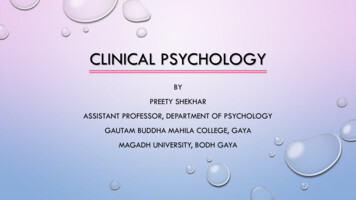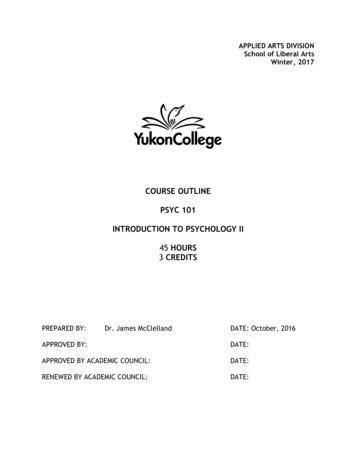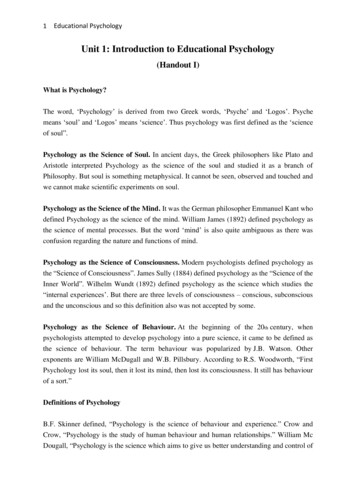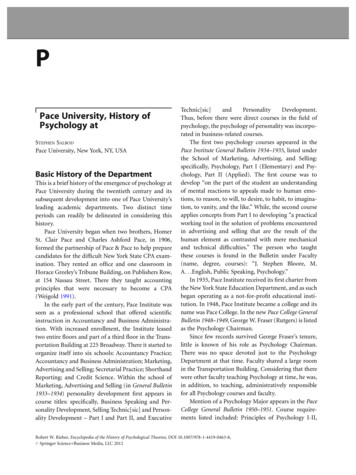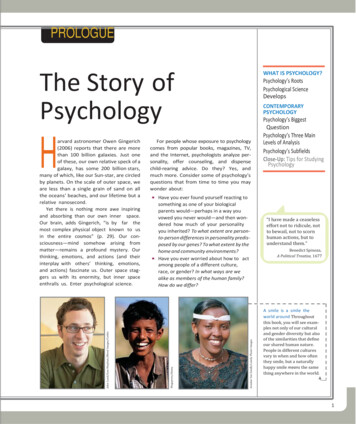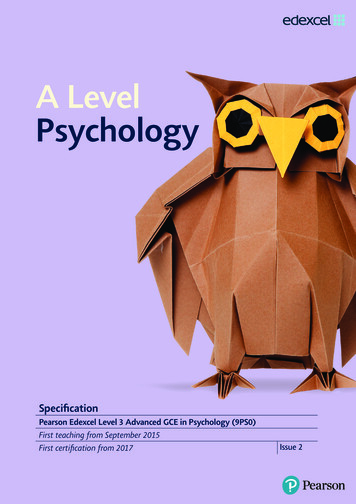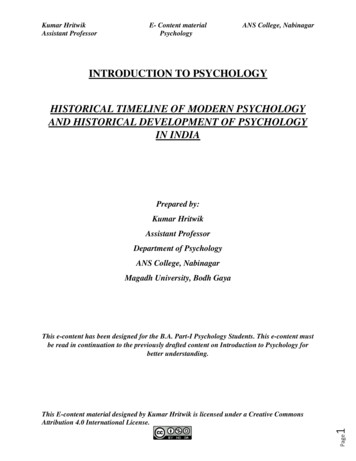
Transcription
Kumar HritwikAssistant ProfessorE- Content materialPsychologyANS College, NabinagarINTRODUCTION TO PSYCHOLOGYHISTORICAL TIMELINE OF MODERN PSYCHOLOGYAND HISTORICAL DEVELOPMENT OF PSYCHOLOGYIN INDIAPrepared by:Kumar HritwikAssistant ProfessorDepartment of PsychologyANS College, NabinagarMagadh University, Bodh GayaThis e-content has been designed for the B.A. Part-I Psychology Students. This e-content mustbe read in continuation to the previously drafted content on Introduction to Psychology forbetter understanding.Page1This E-content material designed by Kumar Hritwik is licensed under a Creative CommonsAttribution 4.0 International License.
Kumar HritwikAssistant ProfessorE- Content materialPsychologyANS College, NabinagarHistorical Timeline of Modern PsychologyThe timeline of Psychology spans centuries, with the earliest known mention of clinicaldepression in 1500 BCE on an ancient Egyptian manuscript known as the EbersPapyrus. However, it was not until the 11th century that the Persian physician Avicennaattributed a connection between emotions and physical responses in a practice roughly dubbed"physiological psychology."Some consider the 17th and 18th centuries the birth of modern psychology (largely characterizedby the publication of William Battie's "Treatise on Madness" in 1758). Others consider the mid19th century experiments done in Hermann von Helmholtz's lab to be the start of modernpsychology.Many say that 1879, when Wilhelm Wundt established the first experimental psychology lab,was the true beginning of psychology as we know it. From that moment forward, the study ofpsychology would continue to evolve as it does today. Highlighting that transformation were anumber of important, landmark events.Important Psychology Events: 19th CenturyThe 19th century was when psychology was established as an empirical, accepted science. Whilemeasures would change within that 100-year span, the model of research and evaluation wouldbegin to take shape. 1878: G. Stanley Hall becomes the first American to earn a Ph.D. in psychology.1879: Wilhelm Wundt establishes the first experimental psychology lab in Leipzig,Germany dedicated to the study of the mind.1883: G. Stanley Hall opens the first experimental psychology lab in the U.S. at JohnsHopkins University.1885: Herman Ebbinghaus publishes his seminal "Über das Gedächtnis" ("On Memory")in which he describes learning and memory experiments he conducted on himself.1886: Sigmund Freud begins offering therapy to patients in Vienna, Austria.1888: James McKeen Cattell becomes the first professor of psychology at the Universityof Pennsylvania. He would later publish "Mental Tests and Measurements," marking theadvent of psychological assessment.1890: William James publishes "Principles of Psychology." Sir Francis Galtonestablishes correlation techniques to better understand the relationships between variablesin intelligence studies.1892: G. Stanley Hall forms the American Psychological Association (APA), enlisting 26members in the first meeting.Page2This E-content material designed by Kumar Hritwik is licensed under a Creative CommonsAttribution 4.0 International License.
Kumar HritwikAssistant Professor E- Content materialPsychologyANS College, Nabinagar1896: Lightner Witmer establishes the first psychology clinic in America.1898: Edward Thorndike develops the Law of Effect.Important Psychology Events: 1900 to 1950The first half of the 20th century was dominated by two major figures: Sigmund Freud and CarlJung. It was a time when the foundation of analysis was built, including Freud's examination ofpsychopathology and Jung's analytic psychology. 1900: Sigmund Freud publishes his landmark book, "Interpretation of Dreams."1901: The British Psychological Society is established.1905: Mary Whiton Calkins is elected the first woman president of the AmericanPsychological Association. Alfred Binet introduces the intelligence test.1906: Ivan Pavlov publishes his findings on classical conditioning. Carl Jung publishes"The Psychology of Dementia Praecox."1911: Edward Thorndike publishes "Animal Intelligence," which leads to thedevelopment of the theory of operant conditioning.1912: Max Wertheimer publishes "Experimental Studies of the Perception ofMovement," which leads to the development of Gestalt psychology.1913: Carl Jung begins to depart from Freudian views and develops his own theories,which he refers to as analytical psychology. John B. Watson publishes "Psychology asthe Behaviorist Views" in which he establishes the concept of behaviorism.1915: Freud publishes work on repression.1920: Watson and Rosalie Rayner publish research on classical conditioning of fear withtheir subject, Little Albert.1932: Jean Piaget becomes the foremost cognitive theorist with the publication of hiswork "The Moral Judgment of the Child."1942: Carl Rogers develops the practice of client-centered therapy, which encouragesrespect and positive regard for patients.Important Psychology Events: 1950 to 2000The latter half of the 20th century was centered around the standardization of the diagnosticcriteria of mental illness, hallmarked by the release of the Diagnostic and Statistical Manual ofMental Disorders (DSM) by the American Psychiatric Association. It is the foundational tool stillin use today to direct diagnosis and treatment.Page3This E-content material designed by Kumar Hritwik is licensed under a Creative CommonsAttribution 4.0 International License.
Kumar HritwikAssistant Professor E- Content materialPsychologyANS College, Nabinagar1952: The first Diagnostic and Statistical Manual of Mental Disorders is published.1954: Abraham Maslow publishes "Motivation and Personality," describing his theory ofa hierarchy of needs. He is one of the founders of humanistic psychology.1958: Harry Harlow publishes "The Nature of Love," which describes the importance ofattachment and love in rhesus monkeys.1961: Albert Bandura conducts his now-famous Bobo doll experiment in which childbehavior is described as a construct of observation, imitation, and modeling.1963: Bandura first describes the concept of observational learning to explain aggression.1974: Stanley Milgram publishes "Obedience to Authority," which describes the findingsof his famous obedience experiments.1980: The DSM-III is published.1990: Noam Chomsky publishes "On the Nature, Use, and Acquisition of Language."1991: Steven Pinker publishes an article introducing his theories as to how childrenacquire language, which he later publishes in the book "The Language Instinct."1994: The DSM-IV is published.Important Psychology Events: 21st CenturyWith the advent of genetic science, psychologists are now grappling with the ways in whichphysiology and genetics contribute to a person's psychological being. 2002: Steven Pinker publishes "The Blank Slate," arguing against the concept of tabularasa (the theory that the mind is a blank slate at birth). Avshalom Caspi offers the firstevidence that genetics are associated with a child's response tomaltreatment. Psychologist Daniel Kahneman is awarded the Nobel Memorial Prize inEconomics for his research on how people make judgments in the face of uncertainty.2003: Genetic researchers finish mapping human genes, with the aim of isolating theindividual chromosomes responsible for physiological and neurological conditions.42010: Simon LeVay publishes "Gay, Straight, and the Reason Why," which argues thatsexual orientation emerges from prenatal differentiation in the brain.2013: The DSM-5 is released. Among other changes, the APA removes "gender identitydisorder" from the list of mental illnesses and replaces it with "gender dysphoria" todescribe a person's discomfort with their assigned gender.2014: John O'Keefe, May-Britt Moser, and Edvard Moser share the Nobel Prize for theirdiscovery of cells that constitute a positioning system in the brain that is key to memoryand navigation.Page4This E-content material designed by Kumar Hritwik is licensed under a Creative CommonsAttribution 4.0 International License.
Kumar HritwikAssistant ProfessorE- Content materialPsychologyANS College, NabinagarHISTORICAL DEVELOPMENT OF PSYCHOLOGY IN INDIAHistory is subjective; for every piece of information there are countless bits of historical factfrom different dimensions which are not completed here. The focus of this timeline is to presentthe facts which are more relevant to the students for the general understanding ofdevelopment/evolution of Psychology in India. The timeline includes main historical informationfrom 1916 regarding the establishment of departments of psychology, universities, transition anddevelopments, great personalities and their contributions, and the new beginnings inpsychological field.Dawn of Psychology in IndiaSinha (1990) describes Indian psychology, as a distinctive psychological tradition, rooted inIndian ethos and thought, including the variety of psychological practices that exist in thecountry. He adds that Indian models of psychology would have vast implications for healthpsychology, education, organizational management and human and social development. Theroots of psychology in India can be traced back to religious and philosophical literature.However, from the time of British colonial era until last decade, the psychology has beendominated by the Western theories and concepts. In 1850s the British East India Companyadopted a policy of finding only European style education within its territories in India. The aimof this policy was to produce a class of Indians with English thinking. To attain this goal, thecollege and university education was modelled after Cambridge and Oxford (Misra G. & AnandC. P, 2012). The applied education system has psychological influence and Indian intellectualsexposed to European thought and modern science. They followed the Western brands ofpsychology. When India began to be an independent country it has major expansion in Indianeducational system too. Indian psychologists slowly started to recognize that they are led byEuropean thoughts and theories. This enlightened insight was a search and wish for anindigenous psychology. The historical development depicted by timeline in the next section.Psychology in Higher Education -Time Line 1916 -The first psychology department and first psychology laboratory in India wasestablished in 1916 under the leadership of Dr. N.N Sen Gupta (Dalal A. K & Misra A.,2010) at Calcutta University. He was a Harvard educated Indian psychologist,Philosopher and professor. He, along with Gunamudian Davi Boaz, is known as thefounder of modern psychology in India.Page5This E-content material designed by Kumar Hritwik is licensed under a Creative CommonsAttribution 4.0 International License.
Kumar HritwikAssistant Professor E- Content materialPsychologyANS College, Nabinagar1922- In 1922 Dr. Girindra Shekhar Bose, who succeeded Dr. N.N Sengupta at CalcuttaUniversity established the Indian Psychoanalytical Society, by his intimate contact andsupport of Sigmund Freud. It is affiliated to the international psychoanalytic Association.Girindra Shekar Bose has the appreciation as the first PhD scholar from Indianpsychological field. He received his PhD from Calcutta on the ‘concept of repression’.1923- In 1923, Sen Gupta as a leading proponent of the scientific nature of psychologicalresearch took effort to include psychology as distinct division of the Indian sciencecongress. Thus psychology in India acquired the status of a science at an early age alongwith the discipline of science, which western psychology achieved after a long struggle.1924 – The second oldest Department of psychology established at the University ofMysore in 1924, headed by M. V Gopalaswamy. The department was offering M.ADegree in psychology until 1998. From 1998 syllabus revision has took place and thedegree offered as M.Sc in psychology.1925- The First Indian Psychological Association established by the constant effort ofS.N Gupta.1926- The Indian journal of psychology is founded and the first official founding editorwas N.N Sen Gupta.1929- In 1929, N.N Sen Gupta, along with Radhakamal Mukerjee published instructionto social psychology which named the first text covering the topic of social psychologypublished in India. In the same year when Sen Gupta appointed as the professor ofPhilosophy at the University of Lucknow, he introduced psychology into the philosophycurricula. It prepared the ground to establish Department of Experimental psychology atthe University of Lucknow.1934- In 1934 Jadunath Sinha wrote a book on Indian theories of perception. It was a realeffort for introducing Indian approach to psychology. At the beginning of modernpsychology, when Western psychology emphasised sensation, and perception, Indianpsychologists took out Indian theories to describe the phenomenon of perception.1938- During the time of Silver jubilee session of the Indian Science Congress Jung,Meyers and Spearman were invited and it helped India to establish an appliedpsychology wing at Calcutta University. Through this development, Indian psychologyassumed an applied stance from the outset. (www.caluniv.ac.in).1943- The Department of psychology emerged from the department of Philosophy in theUniversity of Madras. The founder-head of the Department was DR. G. D Boaz.1944- The establishment of "The Madras Psychology Society" took place in the year1944. It was one of the major contribution in the field of academic and research by theDepartment of Psychology at university of Madras.Page6This E-content material designed by Kumar Hritwik is licensed under a Creative CommonsAttribution 4.0 International License.
Kumar HritwikAssistant Professor E- Content materialPsychologyANS College, Nabinagar1946- Psychology department instituted at Patna headed by H.P Maiti. The departmentprovided opportunities for psychological research and services. Today Patna is famousfor teaching, research and counselling services.1947- Girindra Shelter Bose published journal Samiksha. Patna guidance bureau inspireddepartments of psychology to establish similar bureaus or guidance in other states.Accordingly, UP psychological bureau is started for guidance and counselling by theheadship of Sohan Lal. Psychological bureau at Bihar and the Parsi panchayat vocationalguidance bureau at Bombay are some of these. They adapted intelligence and aptitudetests in Hindi and provided counselling services to the public.1949- Psychological research wing was established by India Government DefenceMinistry with the aim of the inclusion of psychologists on research and selection boards.1950- Department of psychology was established at University of Pune, named asexperimental psychology. Prof. V. K Kothurkar who trained at Cambridge Universitywas the founder and head of the department. During 1980s the department renamed asdepartment of psychology (www.unipune.ac.in).1950- Centring at UNESCO, the ministry of education procured the services of GardnerMurphy to develop a research project to find out the causes of communal violence. ManyIndian psychologists team up on this project and published a book named, In the minds ofmen. This joined project gave lot of interest for research for the scholars.1950s-1960s. In 1956, UGC was constituted and the availability of UGC funds resultedin the establishment of 32 psychology departments in universities of all over India by theend of 1960s. According to the prominence in research area, most of the departmentsdeveloped a distinct identity. Some of the examples for this phenomenon are Rural andSocial Psychology (Allahabad), Test Construction (Mysore), Industrial Psychology(Osmania), and Measurement and Guidance (Patna). An interesting point is that thesedistinctive identities correspond to interest of the headed department personalities of eachplace. As a result, when the department heads transferred the interest too reduced. Duringthese years, applied psychology extended its application to industrial psychology,organisational management, developing training programmes and job - productivityoriented work activities.1957- ‘The Madras psychology society ‘published the first Journal of PsychologicalResearches Published.1961- Department of psychology got late entry in the University of Allahabad which wasthe 4th oldest university in India, known as the ‘Oxford of the East’. Prof. DurganandSinha was the first head of the department, one who trained at Cambridge University andPatna University. (www.allduniv.ac.in).1964- The department of psychology established at Delhi University as an independentdepartment in 1964 under the headship of Prof. H.C. Ganguli. However, the psychologyat the master’s level was introduced in Delhi University in 1957 (www.du.ac.in).Page7This E-content material designed by Kumar Hritwik is licensed under a Creative CommonsAttribution 4.0 International License.
Kumar HritwikAssistant Professor E- Content materialPsychologyANS College, Nabinagar1964- ‘The Madras psychology society’ published the Indian Journal of AppliedPsychology.1955- With the collaborative support of Erikson and McClelland, advanced trainingprogrammes in clinical psychology were introduced at All India Institute of mentalHealth (Today known as NIMHANS) Bangalore.1953- As a parallel study to western psychology, Indian psychologist Jadunath Sinhawrote a book on Cognition.1959-The department of Applied psychology was established in the university ofMumbai. The four streams of study in applied psychology are clinical, counselling,industrial and social.1960s to 1970s, larger number of Indian scholars went to Britain, Canada and the unitedstates for doctoral and post-doctoral training. They applied Western theories and methodsto understand and solve Indian social issues.1961- The National Council of Educational Research and Training (NCERT) reviewedall the psychological tests that had been prepared up to 1961.1967- Though the applied psychology has beginning from 1931, the department ofpsychology in Calcutta officially established applied psychology in 1967 by Prof. S. NRoy (www.caluniv.ac.in).1968-The Indian association of clinical psychologists was started in 1968 (Jain, 2005).On 12 December 1968 an autonomous organization (Indian Council of Social Science)was established to provide valuable help to scholars from all over country throughfellowships and project grants.1969- Indian Villages in Transition: A Motivational Analysis book was authored byDurganand Sinha.1970 - In the 1970s, the increased interest for research caused to come up many wellorganised research centres. Some of the centres are ANS institute of social studies(Patna), the Centre for the Study of Developing Societies (New Delhi), The NationalInstitute of Community Development (Hyderabad), National Council of EducationalResearch and Training (New Delhi), National Institute of Educational Policy andAdministration (New Delhi), National Institute of Public co-operation and ChildDevelopment (New Delhi), National Institute of Health and Family Welfare (New Delhi),Indian Institute of Science (Bangalore), Academic Staff College (Bangalore) and IndianStatistical Institute (Calcutta). Together with this, the discovery of first statistical packagefor the social sciences (SPSS) manual published by Norma H. Nie, Dale H. Bent, and C.Hadlai Hull’s made the research works in psychology an outstanding one.1972- First survey of Research in Psychology in India was published.1974- A directory made by compiling 503 psychological tests. The department ofpsychology started at Bangalore University (www.banagaloreuniversity.ac.in) andBharathiar University (www.buc.edu.in).Page8This E-content material designed by Kumar Hritwik is licensed under a Creative CommonsAttribution 4.0 International License.
Kumar HritwikAssistant Professor E- Content materialPsychologyANS College, Nabinagar1975- By the end of 1975, 51 of the 101 recognised universities were offered psychology.1976- The department of psychology in Madras University developed the department byestablishing criminology, applied psychology, organization psychology and counselling.The publication of journal of Indian psychology established.1970s-1980s- From the mid of 1970s up to 1980s, the discovery that sixty years ofwestern psychology in India had not yielded any significant discoveries promoted a crisisin the discipline of psychology. The crisis took Indian psychologists to reflect back to thecultural roots and to seek out Indian identity in the field of psychology.1981- Jadunath Sinha wrote a book on Emotions and the will which contributed to theIndian psychology approach.1989- National Academy of Psychology (NAOP), India was founded.1995- Out of 219 recognized universities, 70 universities offered psychology (Jain, 2005)1997- The First Asian Conference Psychology was held in Singapore. It includes tencountries named Malaysia, Indonesia, Philippines, Hong Kong, Taiwan, India, Austria,New Zealand, Korea and Singapore and together formed the Asia Oceanic PsychologicalAssociation.1998- The inaugural meeting of the international society of clinical psychologists washeld in San Francisco, United States.2005- The Asian Applied psychology international regional conference was held inBangkok, Thailand. In the same year, Asian psychological association was also held inJakarta, Indonesia.2009- Indian School Psychology Association established in 2009 to promote schoolpsychology in India and Abroad by the guidance and headship of Prof. B. Mukhopadhyay(www.inspa.info)In India, Psychology has European roots. However, in the 21st century, Indian psychology iscapable to stand in its own foot with several universities, significant psychologists andoutstanding organizations rooted in psychological interventions. Today, seventy universities inIndia have well-established psychology departments and institutes for both applied research andthe provision of psychological services to the public (Robert B Lawson, Jean E. Graham, KristinM. Baker, 2008). There is a remarkable shift from experimental work to the understanding of thepsycho-cultural context using Indian traditional ideas in research, in building psychologicaltheories, in developing psychological tests and in the application of psychology to all thedisciplines of university studies and to the needs of nation.In the next lecture we will be talking about list of some famous Psychologists and theircontribution in the field of Psychology and the application/scope of Psychology.Page9This E-content material designed by Kumar Hritwik is licensed under a Creative CommonsAttribution 4.0 International License.
was the true beginning of psychology as we know it. From that moment forward, the study of psychology would continue to evolve as it does today. Highlighting that transformation were a number of important, landmark events. Important Psychology Events: 19th Century The 19th century was when psycholo

